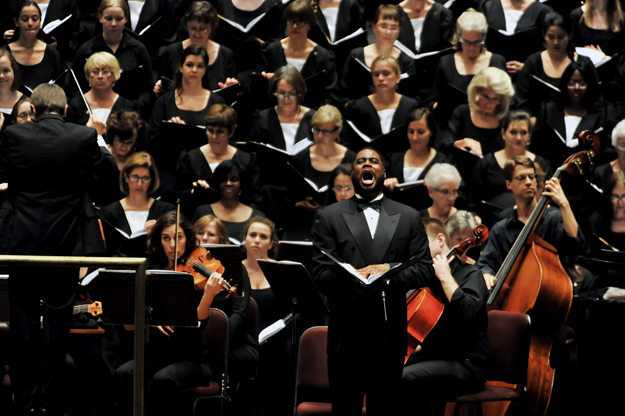
Register by October 17 to Secure Your Spot!
| Registration Type | Member Price |
|---|---|
| Early Bird Registration (Sept. 11-Oct.3) | $750 |
| General Registration (Oct. 4-Oct.17) | $850 |
| Registration Type | Member Price |
|---|---|
| Early Bird Registration (Sept. 11-Oct.3) | $750 |
| General Registration (Oct. 4-Oct.17) | $850 |
| Registration Type | Member Price | Non-Member Price |
|---|---|---|
| Early Bird Registration (Sept. 11-Oct. 3) | $750 | $850 |
| General Registration (Oct. 4-Oct.17) | $850 | $950 |
Not a member? We'd love to have you join us for this event and become part of the Chorus America community! Visit our membership page to learn more, and feel free to contact us with any questions at [email protected].
| Registration Type | Non-Member Price |
|---|---|
| Early Bird Registration (Sept. 11-Oct. 3) | $850 |
| General Registration (Oct. 4-Oct.17) | $950 |
Think you should be logged in to a member account? Make sure the email address you used to login is the same as what appears on your membership information. Have questions? Email us at [email protected].
| Registration Type | Price |
|---|---|
| Individual Session | $30 each |
| All Four (4) Sessions | $110 |
*Replays with captioning will remain available for registrants to watch until November 1, 11:59pm EDT.
Member Professional Development Days are specially designed for Chorus America members. If you're not currently a member, we'd love to welcome you to this event, and into the Chorus America community! Visit our membership page to learn more about becoming a member of Chorus America, and please don't hesitate to reach out to us with any questions at [email protected].
| Registration Type | Price |
|---|---|
| Individual Session | $30 each |
| All Four (4) Sessions | $110 |
*Replays with captioning will remain available for registrants to watch until November 1, 11:59pm EDT.
| Registration Type | Price |
|---|---|
| Individual Session | $30 each |
| All Four (4) Sessions | $110 |
*Replays with captioning will remain available for registrants to watch until November 1, 11:59pm EDT.
Member Professional Development Days are specially designed for Chorus America members. If you're not currently a member, we'd love to welcome you to this event, and into the Chorus America community! Visit our membership page to learn more about becoming a member of Chorus America, and please don't hesitate to reach out to us with any questions at [email protected].

More on navigating the process of finding, hiring, and working with soloists.
Make sure soloists’ audio samples are up to date. Scott Tucker, artistic director of the Choral Arts Society of Washington DC, once hired a well-known bass for a big choral work based on audio, but it turned out his voice was not quite what Tucker had imagined. The lesson, he says, is to cross-reference with trusted colleagues. “Of course, everyone will have an opinion, and in the end you just have to trust your gut.”
Be clear about your own “must haves” for a solo voice. Tucker says that for him, “intonation is huge, but others may have different priorities, like the size of the voice. But you need to trust your own priorities.” Those priorities will depend on the nature and mission of the chorus. The Midcoast Community Chorus in Rockport, Maine champions the common voice, so artistic director Mimi Bornstein listens for “a sound that opens my heart,” not a professional, polished sound.
Select the soloist who has the right voice type for the part. Several soloists recall being asked to take roles that were clearly not suitable for them. Marlissa Hudson, a coloratura, once was asked to do the mother role in Amahl and the Night Visitor. “But that kind of experience is rare,” she says. “Most conductors know as much or more than I do about my voice.” Chicago-based tenor Rodrick Dixon says it is primarily the soloist’s responsibility to make sure he or she is “put in a position to succeed, not to fail. You need to own and present what your voice is capable of doing, and then manage your life offstage so that you can meet the expectations when given the opportunity.”
Give young soloists opportunities that will contribute to, not derail, a promising career. “I love to give young singers a chance to be discovered and develop their chops and their resume,” says Gretchen Kuhrmann, artistic director of Choralis in Washington DC. “But I am very careful about what I put them forward for. Soloists with less experience may arrive on the concert stage with issues that were not detected in an audition.” Tucker says it can be helpful to test up-and-coming soloists in roles that are less demanding before hiring them for larger jobs.
Choose soloists who match the caliber and reputation of your chorus. “When your chorus has a reputation for a certain level or certain quality, you want to make sure the soloists reflect what the orchestra is doing as well as all the hard work the chorus is doing,” Kuhrmann says. “So it is unlikely that you will see an untried person with one of the larger-budget choruses. You want people who will not only be spectacular but are easy to work with, musical, and amenable to working with the conductor.”